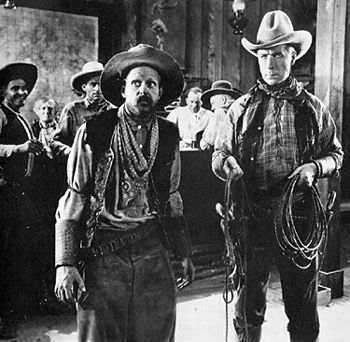|
30 Great Westerns
William S. Hart's career in movies began back in 1914 when he directed and starred in movies at Bison Films, a legendary studio of the silent period that made movies with real cowboys, Indians, stagecoaches, and buffalo herds. Hart directed a huge number of two-reelers at Bison Films, as did famed director Thomas Ince. In 1915 alone, Hart made no less than 16 movies. He quickly became one of the most popular Western heroes, and likewise he commanded one of the highest salaries in Hollywood, equal to that of Chaplin and Fairbanks.
Hart loathed the contrivances and artificiality of typical Hollywood Westerns. He insisted on stark realism, with sets that carefully evoked a vision of the West that Hart knew first hand from growing up in the Midwest. However, by 1925, the year of Tumbleweeds' release, Hart was 60 years old. Tumbleweeds would be his last movie. By this time, the epic Western was in vogue, with The Covered Wagon and The Iron Horse attracting huge returns at the box-office. Hart's smaller scale Westerns looked quaint in comparison. Not coincidentally, Hart's audience had begun to disappear. Therefore, with Tumbleweeds, Hart conceded to the current fashion and created his own epic Western.
Focusing on the Oklahoma land-opening of 1889, Hart staged a mammoth-sized land rush with thousands of homesteaders camped at the border, waiting for the cannon boom that will signal the border is open. Those who creep over the border early ("Sooners") will be captured by U.S. Army soldiers and thrown into a bullpen.
Hart plays a ranch hand, who is now out of a job because the U.S. government has forced ranchers to vacate the Cherokee Strip. This large tract of land (approximately 1,200 square miles) had previously been leased to ranchers. But now they have been forced to leave so that farmers can move in. Before he leaves the territory, Hart encounters a rattlesnake and pulls his gun, but he thinks twice: "Go ahead an' live," he says. "You've got a whole lot more right here than them that's a comin'." The movie communicates an overwhelming sense of loss as we witness huge herds of cattle being rounded up and moved out of the territory. "Boys, it's the last of the West," says Hart.
But Hart isn't merely interested in depicting the end of an era. For the love of a woman, Hart eagerly joins the land rush with the intention of grabbing a choice plot of land so that he and his sweetheart can settle down. Initially Hart complains, "Women ain't reliable. Cows are." But he changes his tune after meeting Molly Lassiter (Barbara Bradford, in a rather dull performance). This love story pits Hart against his girlfriend's evil brother, who seeks to claim the same piece of land that Hart seeks and isn't above murder in order to reach his goal.
Hart's movies didn't typically contain romantic sub-plots, but Tumbleweeds contains several compromises to popular taste, including the aforementioned epic scale. In addition, Tumbleweeds provides Hart with a comic sidekick. Typically, Hart kept to himself, but this time out, Lucien Littlefield plays a crotchety old-timer who becomes Hart's best friend.
The movie's most impressive sequence remains the land rush. All manners of vehicles -- covered wagons, surreys, stagecoaches, even a large-wheeled bicycle -- bounce over the prairie in the mad rush to claim land. Other films would attempt to recreate the Oklahoma hand rush -- such as Cimarron, which won the Best Picture Academy Award in 1931 -- but Tumbleweeds remains the best example.
The 1939 re-release print of Tumbleweeds includes an impassioned eight-minute introduction by Hart as he talks about the glories of the old West. Hart's respect for the West shows through in nearly every frame of the movie. He projects a regal posture, his shoulders thrown back, his chest forward, his chin up. (He only hunches his shoulders submissively when a woman is present.) Hart was the king of the West and Tumbleweeds is arguably his finest film. However, Tumbleweeds was only a mild box-office success. Poor distribution may have been to blame. But whatever the case, Hart held little interest in continuing to make movies designed to appeal to mass audiences. He subsequently retired to his own ranch.
--by Gary Johnson
|
